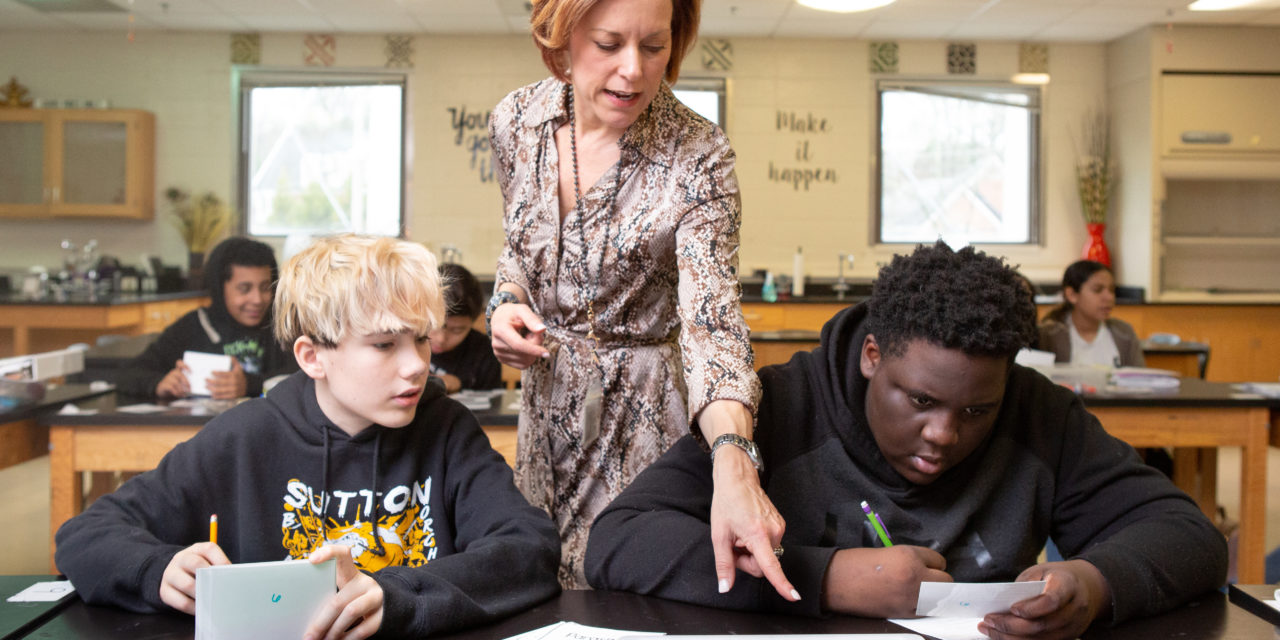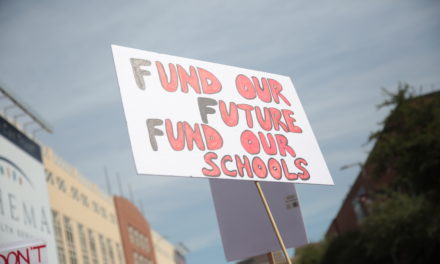Charges that public schools are subjecting children to leftwing indoctrination are proving to be mostly over-hyped or not at all based in fact. Yet, there’s evidence, according to a new report, that a fast-growing sector of the charter school industry is engaged in indoctrination, only, in this case, the schools are instructing children in white, conservative ideology.
The report, “A Sharp Turn Right: A New Breed of Charter Schools Delivers the Conservative Agenda” by the Network for Public Education (NPE), finds that charter schools that market to families a “classical” or “traditional” approach to schooling are essentially catering to parents and politicians that follow “right-wing ideology.”
Using keyword searches, news stories from local and national media, and examinations of charter school websites and other resources, the authors claim to have “identified a representative sample” — 273 currently open charter schools — that resemble their definition of what constitutes a right-wing educational agenda.
The report authors offer this number with the caveat that “we are confident there are schools and even chains we missed.”
Two principal criteria the authors used to determine the political leanings of the schools were whether they offered what’s commonly called a “classical” curriculum or a “back-to-basics” curriculum and/or whether the schools’ websites made politically conservative or religious references or were “designed to attract white conservative families.”
Other evidence the authors looked for to determine a school’s political orientation was whether the charters’ owners or founders had publicly stated overtly conservative political beliefs or had substantial connections to right-wing individuals or advocacy groups.
Some charters blatantly signaled their education agendas by, for example, having a cross on their buildings or exhibiting religious symbols or hyper-patriotic messages in school common areas.
The report also accuses this sector of the charter school industry of enrolling mostly white and middle-class and wealthy families and discouraging attendance of low-income and non-white families.
“Unlike the entire charter school sector, the overall student body of these charter schools is disproportionately white,” the report states, citing evidence from the 2021-2022 school year that “more than 52 percent of the students who attended these charter schools were white, compared with 29 percent of all charter school students. Nationally, nearly one in four charter students is Black. In right-wing charters, Black students comprise only seven percent of enrollment.”
Students who were eligible to receive free or reduced-price lunch, a typical measurement of poverty, were also under-represented in these schools, making up only 17 percent of students enrolled in these charters “compared with 48 percent of all charter school students and 43 percent of the students in democratically-governed public schools.”
Moreover, these schools are a growing presence in the nation’s education system since the election of Donald Trump as president. “Since the inauguration of Donald Trump, the number of classical and right-wing charter schools has grown by 90 percent with 66 more schools in the pipeline,” the report assesses. “Forty-seven percent of the schools we identified opened since [his] inauguration.”
The report challenges the notion that charter schools are a bipartisan or even progressive issue, as they are often framed, and calls into question whether public school tax dollars should continue to pour into the charter industry.
“Charter schools took a sharp turn right and now serve a purpose never imagined by their early proponents,” the report concludes. “[T]hese new laboratories of right-wing thought are flourishing with the silent accord of charter school supporters on both the left and right ends of the political spectrum.”
A Threat to ‘Upend American Education’
The report comes at a critical time as the nation’s first religion-based charter school has been allowed to open in Oklahoma.
Up until now, “[charter] schools [were] deemed public by state law, and must be secular just like any other public school,” according to Chalkbeat reporter Matt Barnum. Allowing a religious charter to open — in this case, an online charter school affiliated with the Catholic Church — “is a direct challenge to existing charter laws, which critics say discriminate against churches and other religious entities,” Barnum states.
“The prospect of religious charter schools threatens to upend American education, far beyond Oklahoma,” Barnum continues, contributing to “the successful conservative campaign to allow more public funding to go to religious education.”
Also hanging in the balance, Barnum writes, is a current U.S. Supreme Court case — Charter Day School, Inc. v. Peltier — that would potentially rule whether charter schools are public or private actors. Should the court rule that charter schools are private entities, the ideologically conservative charters that NPE examines in its report would not only flourish; they would become even more blatant in their instruction of right-wing ideology and more restrictive in denying non-Christian, non-conservative, and LGBTQ+ students to enroll in their schools.
Indeed, the charter school chain at the center of this supreme court case, the Roger Bacon Academy, is examined extensively in the NPE report.
The report calls attention to the daily oath students at the schools are required to chant, in which they pledge to, among other things, “[guard] against the stains of falsehood from the fascination with experts … and from over-reliance on rational argument.”
The report also notes that the schools run by the company “emphasize a ‘traditional curriculum, traditional manners, and traditional respect’ — ‘more like schools were 50 years ago compared to now,’ according to one of its board members.”
While these calls for “traditional” education can seem non-controversial, NPE warns they are a type of “dog whistle” to convey a right-wing political agenda and a marketing strategy to “attract conservative families with Christian nationalist identities anxious to place their children in schools that reflect early- and mid-20th century values, pedagogy, and curriculum.”
Dog Whistles That Signal Right-Wing Ideology
Among the dog whistles the report cites are uses of the word “classical” in the schools’ branding and marketing and promises on their websites and other marketing materials to “[emphasize] Eurocentric texts and the study of Latin and Greek.” The report says these are signals for attracting conservative families and discouraging families who’d want their children instructed in a broader range of viewpoints and perspectives.
In classical schools that have overtly Christian personae, “the curriculum focuses not only on the Western canon — Homer to C.S. Lewis — but also on scripture,” the report states.
Other dog whistles the report describes include the use of “red, white, and blue decor, patriotic insignia, white students and teachers featured almost exclusively on [the schools’] websites, and the generous use of the word ‘virtue,’” in their marketing.
These are meant to “signal to families which students would be a ‘good fit’ for the school,” the report states.
According to NPE, “more than 80 percent of the new classical charter schools have websites designed to attract Christian nationalist families.”
Another type of charter school the report designates as overtly conservative offers a “‘back to basics’ curriculum without necessarily identifying the curriculum as classical.”
These charters use a similar marketing strategy of “[including] right-wing clues on their website[s] to attract families with Christian nationalist beliefs. Such clues include red, white, and blue school colors, patriotic logos, pictures of the founding fathers, using terms such as virtue, patriotism, and even outright references to religion.”
Sometimes the dog whistles the report describes come from the founders or leaders of the schools. One example came from the founder of the Tulsa Classical Academy who said his school is “a school that’s about justice, not ‘social justice.’ Virtue, not ‘virtue-signaling.’ Objective truth, not ‘your truth’ and ‘my truth.’”
As a result of these marketing tactics, the NPE report finds, “[These charter schools] are whiter and infused with Christian nationalist leanings and aligned with right-wing leaders who make no secret of their plans to turn back progress.”
Schools With Strong Ties to Conservative and Christian Ideology
The NPE report also cites numerous anecdotes showing the strong ties that many of these charters have to conservative, Christian ideology and right-wing advocacy groups.
One example the report points to is Great Hearts Academies, a company operating an extensive network of 34 classical charter schools in Texas and Arizona. In 2018, the report notes, Great Hearts enforced a policy requiring students to use bathrooms “corresponding to the gender listed on their birth certificates.” The company eventually reversed the policy after students formed groups to protest the policy, according to NPE.
Also, Great Hearts launched a network of “micro-schools,” as alternatives to public schools during the pandemic, according to NPE, some of which are “located in churches.” And the company announced in 2023 that it was opening a network of Christian private schools.
Another charter school chain the report identifies as being a conveyor of right-wing ideology is the extensive network of schools operated by Hillsdale College and its Barney Charter School Initiative.
The report references a 2022 series of articles by Kathryn Joyce in Salon, that reported that Hillsdale College, a small private college based in Michigan, “has inconspicuously been building a network of ‘classical education’ charter schools, which use public tax dollars to teach that systemic racism was effectively vanquished in the 1960s, that America was founded on ‘Judeo-Christian’ principles and that progressivism is fundamentally anti-American.”
Hillsdale’s Barney Charter School Initiative, according to the NPE report, was started with funding from the Barney Family Foundation and the fortune of Stephen Barney and his wife Lynne, who control the foundation.
The report states, “An examination of the foundation’s 990s reveals that in addition to its health and child-centered charities, it also generously funds right-wing think tanks, foundations, and even organizations that exist to create right-wing model legislation. Beneficiaries include Americans for Prosperity, the Cato Institute, Hoover Institution, the Heartland Institute, State Policy Network, [EdChoice], and the Heritage Foundation.”
The Barney Foundation’s political leanings are reflected in the Hillsdale College’s curriculum, according to NPE. Hillsdale charters often teach the college’s 1776 curriculum, which, the report states, “disparages the New Deal and affirmative action while downplaying the effects of slavery. Climate change is not mentioned in the science curriculum; sixth-grade studies include a single reference to global warming.”
“Another feature of Hillsdale schools is the relative homogeneity of their student body: whiter and wealthier than public schools and other charter schools,” according to NPE. “During the 2021 school year, 66 percent of all Hillsdale-affiliated charter school students were white, and only 12 percent were eligible to receive a subsidized lunch, making Hillsdale charter families not only less diverse and more affluent than the public and charter sectors but even whiter and wealthier than the right-wing charter sector as a whole.”
What the Charter School Coalition Got Wrong
Although the NPE report asserts that the rise of right-wing charter schools “serve[s] a purpose never imagined by their early proponents,” it doesn’t fully explain how conservatives were able to hijack that purported original intent to serve their political means instead.
NPE credits the origins of the charter school idea to education professor Ray Budde, who, in the 1970s, had a “vision [that] states would give schools the authority to create innovative, experimental programs at existing schools.” But there is another origin story that more fully explains how charters became so vulnerable to right-wing co-option.
In her 2017 article for Democracy, journalist Rachel Cohen traced the origin of the charter school idea to, not Budde, but Ted Kolderie.
Cohen describes Kolderie as “quintessentially neoliberal” and a self-described “policy entrepreneur” who was “in the middle of discussions over school reform” in “the 1970s, ’80s, and ’90s.”
Under his direction, the Minnesota-based Citizens League, was “a powerful, centrist Twin Cities policy group,” according to Cohen, that advocated for “different ways to provide government services, including education.”
“One of Kolderie’s central ideas,” Cohen wrote, “was to ‘end the exclusive franchise’ of school districts providing public education. In several reports, he described the decline of public education as the direct consequence of public districts’ monopolistic power over schooling. His proposal: independent schools, accountable to parents through free market choice, and to the government through a set of contractual obligations. He specified that many different types of entities — universities, corporations, public school districts, nonprofits — should be able to manage these new schools, state law permitting.”
Among the proposals Kolderie and his organization pushed for was “cooperatively managed schools,” which Cohen described as being “strikingly similar to modern-day charters.”
Cohen described Kolderie not as a political operative but as a prominent leader of “technocratic centrists” who “focused on deregulation, disruption, and the hope of injecting free market dogmas into the public sector.”
Their vision, as Cohen described it, is that getting education right is not so much an ideological issue as it is about better systems engineering.
This vision, according to Cohen, was adopted by prominent policy leaders and politicians of both parties in the 1990s and brought about the powerful coalition of business leaders and moderate Democrats and Republicans that created and spread the charter school movement.
But what the charter school coalition got wrong is that education is not just about getting the system “right.” It’s also about values.
Sure, students need to learn how to read and do math. But students also need to learn how to interact with one another; how to care, not just for themselves, but for their fellow human beings; and how to contribute positively to their families and communities.
And if we want to live in a democratic society, that means teaching students about the values of an inclusive democracy that includes people of diverse cultures and beliefs.
But by creating an approach to education that was determined to be apart from, even opposed to, democratic values that are often imposed by public governance of schools, charter school proponents created empty vessels of education institutions that are void of the principles that are shared in a society that upholds a common good.
And we know what happens when there’s a void. As NPE’s report shows, the void is rapidly being filled by the same politically extremist faction that elected Trump and now threatens to impose an authoritative vision for the country.
“The only question that remains,” the report concludes, “is whether moderate, progressive, and liberal-minded voters and politicians recognize where the runaway charter movement is headed.”
(Photo by Allison Shelley for American Education: Images of Teachers and Students in Action, CC BY-NC 4.0).






Recent Comments